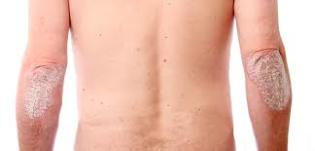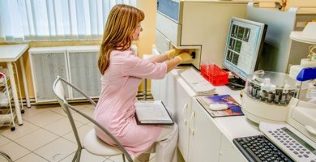Psoriasis is non-communicable disease of the skin, which is expressed by the education red scaly blotches, covered with itching silver. Usually, the psoriasis develops in young people aged 20 to 30 years. The disease is not a threat to the life of man, but to cause him serious psychological harm, up to social isolation.

The causes of the disease
Causes of psoriasis, to this day, until the end is not identified. There are some factors that bind with the appearance of psoriasis. These factors, however, are not capable of causing the psoriasis, only in combination with the other, they can serve as an impetus to the development of this pathology:
- a genetic predisposition;
- the reduction of the protective properties of the body;
- disorders psycho-emotional;
- pathology of the endocrine system.
It is assumed that psoriasis can be the result of an imbalance in the functioning of the immune system. In the thickness of the skin accumulates a large number of T-cells, which leads to a chronic inflammation of the affected areas. The histological examination of psa material is confirmed by the presence of high concentration of immune cells on the infested areas, which is used to confirm immunological factor in the development of psoriasis.
Predisposition to psoriasis is confirmed by the presence of mutations on several areas of the DNA. These sites are responsible for the development of immune cells lymphocytes. The breakdown of these sites may cause the development of psoriasis. Thus, if the parents are suffering from psoriasis, the risk of developing this pathology in the child is 50% and even more. Scientists also communicate the development of psoriasis among adults with mutations of certain genes.
The cause of the development of psoriasis can be stress that leads to an exacerbation of the symptoms of the disease. Psycho-emotional disorder is able to trigger the release of hormones in the blood, leading to a series of biochemical reactions, which in their turn contribute to the emergence of various rash on the skin.
The study of the etiology of psoriasis has shown that many patients have disorders of the part of the endocrine system and the reproductive system, there has been a violation of the procedure of the education of the pigmentation.
You can also mention the auxiliary of factors favourable to the development of psoriasis: the environment, an injury, an unbalanced diet, poor living conditions, the violation of fundamental principles of hygiene.
We can say that psoriasis is a hereditary disease of a certain disease: in its development it sacrifices a complex of the above causes.
The symptoms of the disease and its types
Psoriasis has some general information on the specific symptoms, to diagnose the disease. In the case of psoriasis develop the three characteristics of the state:
- "paraffin" spots that when you try to curettage of the nail, exfoliate, and its consistency similar to wax and stearin;
- red shiny on the surface, which is formed after the separation of scales and platelets. It is commonly referred to as terminal film;
- very characteristic of psoriasis — the symptoms of the "bloody dew." If to scuff the glitter and platelets, to the surface of the skin will produce small bloody point-like drops of dew.
The more often skin rash psoriatic are located in the area of the bending of the large joints, in the armpit, on the scalp, in the groin, under breasts, on the nails. The disease begins with the appearance of small itchy symmetrical rash, and then they blend into a large conglomerate, taking up large areas of the skin. The itching is not tolerable, and the division of the scales causes the emergence of the "bloody dew."

The diagnosis of psoriasis causes a certain complexity, because there are many types of this disease. Psoriasis has the following form:
- vulgaris (psoriasis vulgaris);
- the psoriasis with platelets;
- are the pustular psoriasis;
- psoriasis flexural surfaces;
- acupressure or guttate psoriasis.
Each type of psoriasis has its own code in an international qualification of diseases (ICD-10). Each variant of the disease has its signs, symptoms, and causes.
The treatment of psoriasis
The psoriasis treatment is very difficult, because the disease is chronic with remissions temporary. However, these days, you can greatly improve the condition of the patient by reducing the clinical manifestations. The treatment of psoriasis is the integrated application of holistic drug treatment, the premises of a drug treatment, the application of methods of physical therapy and immunomodulators.
Mainly used by topical to the health of outdoor applications. The composition of these drugs include substances containing:
- Glucocorticosteroids hormones that are able to be active in preventing the division of skin cells, as well as reducing the inflammation, itching of the skin and depression of the immune system.
- Preparations with a basis of vitamin D, the efficiency of which is manifested in the compartment of the ultraviolet irradiation.
- Drugs carbon zinc, which quickly eliminate the itching of the skin and flushing of the skin.
For the system (in total) in the treatment of psoriasis apply:
- Corticosteroids, which eliminates the symptoms of inflammation and regulate the metabolism.
- Cytostatics inhibit cell division that is uncontrolled.
- Immunomodulatory eliminate a dysfunction in the functioning of the immune system.
- Drugs non-steroidal, thereby eliminating only the symptoms of the disease: inflammation and itching, while not affecting on the causes of the disease.
The physiotherapy includes a number of procedures:
- PUVA-therapy. This method involves the use of light-responsive to a chemical substance that is used in conjunction with long-wave uv.
- Girudoterapiya. The use of leeches for the treatment of psoriasis, which improve the flow of blood.
- The cryotherapy. The method resides in the immersion of the patient for a few minutes in a device to very low temperature of the air. This method allows to eliminate effectively the manifestation of the foci of inflammation and greatly reduce itching.
The treatment of psoriasis traditional methods, sometimes gives good results. Before starting any treatment requires the consultation of a dermatologist. The physician must be aware of the treatments and completely approve.
The complication and the prevention of psoriasis
Complications of psoriasis is manifested by serious diseases, which are very difficult to treat: psoriatic arthritis is pustular psoriasis and psoriatic erythroderma. The prevention of the disease includes of the remedial measures:

- the holiday homes of the therapy;
- a well-balanced diet;
- a healthy sleep;
- the scanning of the foci of chronic infection;
- the compliance with hygiene standards;
- moderate sports.
























